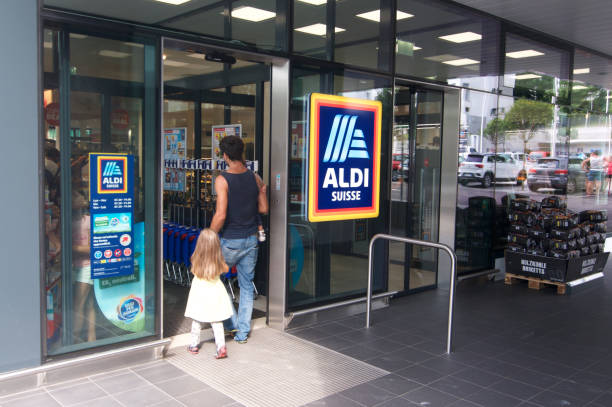Currently, Aldi, the international supermarket chain, is not publicly traded on the stock market. There is no “Aldi stock market price” available since individual investors cannot trade the company’s shares publicly. Understanding Aldi’s status and why it lacks a stock market price involves exploring its structure, business strategy, and possible market impact if it were to become a public entity.
Aldi’s Ownership Structure
Aldi operates under a private company structure, meaning it is owned by private individuals rather than public shareholders. The company is split into two entities: Aldi Nord and Aldi Süd. In the 1960s, a dispute over cigarette sales led to the separation of the founders Karl and Theo Albrecht. Aldi Nord now operates stores in northern Germany and international markets, while Aldi Süd oversees operations in southern Germany, the U.S., the U.K., and Australia.
Because Aldi is privately held, it lacks a stock symbol and market price seen in publicly traded competitors like Walmart, Costco, and Kroger. This private ownership enables Aldi to pursue long-term strategies without the need to prioritize short-term profits for shareholders, a common requirement for public companies.
Benefits of Aldi’s Private Ownership
Long-Term Strategy Focus: Being privately held means Aldi can prioritize long-term investments and maintain its focus on expanding store locations, increasing operational efficiency, and keeping prices low. Public companies often face pressure from shareholders to deliver quarterly earnings results, which can lead to more short-term planning.
Operational Flexibility: Without the scrutiny of Wall Street, Aldi can make decisions without public pressures or disclosures. For example, Aldi can adjust pricing strategies, invest heavily in supply chains, or introduce new product lines without public scrutiny that could impact stock prices.
Lower Costs and Efficiency: Aldi is renowned for its efficiency, lean supply chain, and cost-cutting measures. Because it is not publicly traded, it does not need to allocate funds for activities such as investor relations or regulatory filings with the Securities and Exchange Commission (SEC). This contributes to its ability to offer consumers lower prices.
Aldi’s Financial Success and Market Performance
Despite the absence of a direct Aldi stock market price, its success as a private company is clear through its expanding global presence and growing market share. Aldi has over 12,000 stores across more than 20 countries. The company’s business model revolves around offering a limited selection of high-quality products, with a focus on private-label brands, which account for a large percentage of Aldi’s inventory.
Aldi has gained significant market share in countries like the United States, where it continues to expand aggressively. In recent years, Aldi has committed billions of dollars to remodel existing stores and open new ones. Its affordability and competitive pricing make it a key rival to big grocery chains, causing market disruption.
Hypothetical Aldi Stock Market Valuation
If Aldi were to go public, speculation about its stock market price would likely focus on its market valuation. This valuation would depend on several factors, including Aldi’s revenue, profitability, growth potential, competitive position, and market conditions. Analysts could compare it to publicly traded peers to estimate a potential market capitalization. Aldi, with its unique model and private ownership, makes direct comparisons challenging against competitors such as Walmart and Costco, valued at hundreds of billions of dollars.
Public vs. Private: The Impact of Going Public
If Aldi issued public stocks, the market factors like demand, trading, performance, and investor sentiment would affect its stock price. Going public could raise capital but also result in scrutiny and shareholder pressure, posing challenges to maintaining low prices and efficiency.
Potential Pros and Cons of an Aldi IPO (Initial Public Offering)
Pros:
- Increased Capital: An IPO would provide Aldi with significant capital for expansion and infrastructure improvements.
- Market Visibility: Publicly traded companies often gain increased market visibility and brand recognition.
Cons:
- Loss of Control: Public shareholders would gain influence over corporate decisions, potentially affecting Aldi’s ability to operate with its current long-term vision.
- Disclosure Requirements: Going public would require greater financial transparency and compliance with regulatory bodies, potentially adding costs and complexity.
- Pressure for Short-Term Results: Shareholder expectations for consistent profit growth could shift Aldi’s focus from its core strategy of low-cost operations and customer satisfaction.
Alternatives for Interested Investors
While there is no direct Aldi stock market price available, investors interested in the grocery retail sector have numerous options among publicly traded competitors. Some alternatives include:
- Walmart (WMT): A dominant player in the global retail sector, including grocery sales.
- Costco Wholesale Corporation (COST): Known for its membership-only model and bulk product sales.
- Kroger (KR): A large U.S.-based supermarket chain with a significant market presence.
Investing in competitors can provide insight into grocery industry trends like e-commerce growth, evolving consumer preferences, and competitive pricing.
Conclusion
In summary, Aldi does not have a stock market price due to its status as a privately owned company. If Aldi were to go public, it could affect the retail and grocery industry profoundly, generating significant interest and speculation about its stock performance and valuation, despite private benefits like focusing on efficiency and strategy.

